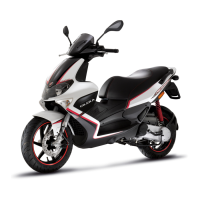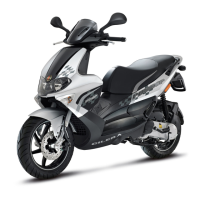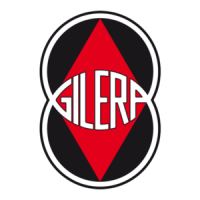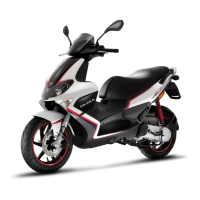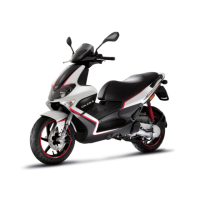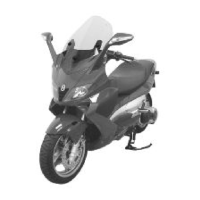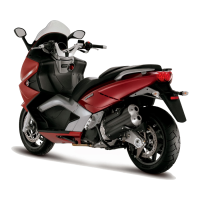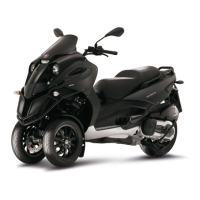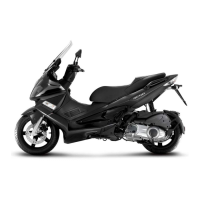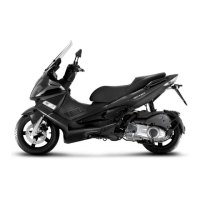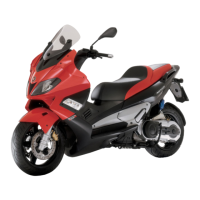Do you have a question about the Gilera Runner RSTPurejet and is the answer not in the manual?
General safety guidelines for maintenance operations on the vehicle.
Guidelines for using genuine parts, proper tools, and general maintenance practices.
Chassis and engine identification prefixes for the Gilera Runner RST Purejet.
Specifications for the vehicle's physical dimensions and weight.
Detailed technical specifications of the engine, including capacity and ratios.
Capacities for the gas tank, oil tank, cooling circuit, and rear hub oil.
Details of the vehicle's ignition, battery, fuses, and generator.
Specifications for the chassis type, front, and rear suspension systems.
Specifications for the front and rear disc brake systems.
Specifications for wheels, tyres, and recommended tyre pressures.
Required torque values for various fasteners during assembly and maintenance.
List of specific tools, including their codes and descriptions, for various repair tasks.
Scheduled maintenance tasks organized by mileage intervals (e.g., 1,000 km, 5,000 km).
Procedure for checking, adjusting, and replacing the spark plug.
Procedure for checking and maintaining the hub oil level.
Instructions for removing, cleaning, and recommended products for the air filter.
Procedure to access and remove the fuel filter for inspection or replacement.
Maintenance and adjustment procedures for the vehicle's transmission control cables.
Procedure for adjusting the mixer timing for optimal engine performance.
Procedure for checking the coolant level and recommended top-up fluids.
Procedure for adjusting the vehicle's headlight beam alignment.
Identifies causes and operations for engine overheating problems.
Troubleshooting steps for a clutch that grabs or performs inadequately.
Procedures to diagnose and fix issues with insufficient braking performance.
Troubleshooting steps for overheating brake systems.
Information on battery maintenance, checks, and warnings.
Troubleshooting steps for non-functional turn signal lights and horn.
Troubleshooting for stiff or hard steering.
Troubleshooting for excessive looseness or backlash in the steering.
Diagnosing and fixing noises coming from the suspension system.
Troubleshooting steps for oil leaks from suspension components.
Diagram illustrating the electrical connections and component layout of the vehicle.
Diagrams illustrating various electrical system concepts and functions.
Details on the vehicle's ignition system components and operation.
Procedures related to headlight operation and the automatic starter system.
Steps for recharging the battery and starting the vehicle.
Information on vehicle level indicators and system enable signals.
Troubleshooting and checks for turn signal and horn circuits.
Description of the instrument panel and its warning lights.
Explanation of the battery recharge circuit and its components.
Procedure for checking the stator's continuity and insulation.
Steps to check the voltage regulator and starter motor system.
Dynamic tests to verify electrical system operation and component health.
Checks for the turn indicator circuit and related components.
Checks for fuel level transmitter and related indicators.
Warnings and procedures for handling and commissioning dry-charge batteries.
Routine checks and maintenance procedures for the vehicle battery.
Step-by-step instructions for removing the engine from the vehicle.
Procedures related to the automatic transmission system, including cover removal.
Steps to remove and refit the bearing for the driven pulley shaft.
Steps to remove the driven pulley assembly and inspect the clutch drum.
Procedure for checking clutch mass friction material and removing the clutch.
Steps to remove and refit the bearing from the driven half-pulley.
Checks for wear and dimensions of the fixed and sliding half-pulleys.
Steps to refit the driven pulley assembly, including belt and related parts.
Inspection of the clutch spring and procedure for refitting the clutch assembly.
Checks and inspection of the drive belt for damage and width.
Steps to remove the driving pulley and associated components.
Procedure for removing the transmission cover.
Checks for wear and deformation of rollers and sliding surfaces.
Procedure for refitting the driving pulley unit, including belt and nut.
Operations related to the final gear drive assembly, including cover and axle removal.
Steps to remove the bearing from the driven pulley shaft.
Checks for wear and deformation on hub shaft surfaces.
Procedure for refitting the bearing onto the driven pulley shaft.
Steps for refitting the wheel axle bearing into the crankcase.
Procedures for removing and refitting the flywheel cover.
Steps to remove and refit the stator from the flywheel cover.
Operations related to cylinder assembly and timing system adjustments.
Steps to remove the cylinder head and its associated components.
Procedure for removing the cylinder and piston assembly.
Inspection of the connecting rod's small end and wrist pin.
Measuring piston-pin coupling clearance and checking cylinder condition.
Checks for cylinder seizure and piston ring opening measurements.
Steps for removing the piston from the connecting rod.
Procedure for selecting the correct cylinder base gasket thickness.
Steps for refitting the cylinder head and timing system parts.
Procedures for replacing the air injector's carbon dam ring.
Operations related to the crankcase and crankshaft, including stator and pulley removal.
Procedure for separating the crankcase halves.
Steps to remove the crankshaft and its bearings.
Instructions for refitting crankshaft bearings using temperature assembly.
Checks for wear on crankshaft components, including alignment.
Checks on crankcase fitting surfaces, bearings, and oil seals.
Detailed steps for refitting the crankshaft into the crankcase halves.
Procedures for removing, checking, and refitting the air compressor.
Steps for refitting the oil pump and the purging procedure.
Detailed steps for overhauling the front wheel hub bearings and spacers.
Procedures for removing and refitting the rear wheel.
Procedures for removing and refitting the shock absorbers.
Detailed explanation of the Electronic Multi-Point (EMS) injection and ignition system.
Important safety and procedural precautions before working on the injection system.
Diagnostic suggestions and common faults for the injection system.
Explanation of the self-diagnostic function and fault reporting levels.
Steps to connect and navigate the diagnostic tester functions.
Procedure for resetting the Throttle Position Sensor (TPS) signals.
List and explanation of parameters displayed by the diagnostic tester.
Table of error codes, their causes, and indicator lights.
Function to calibrate the throttle body with the ECU.
Diagram and checks for the ECU power supply circuit.
Procedures for checking electrical circuit integrity and connections.
Diagram and steps for connecting the diagnostic tester.
Details on TPS circuit terminals, conditions, and standard values.
List of TPS-related error codes and their diagnostic interpretations.
Information on the High Tension (H.T.) coil circuit and its diagnostics.
Checks for battery voltage and continuity in the H.V. coil primary circuit.
Pneumatic inspections of the compressed air system for injection.
Procedure for diagnosing the air injector's activation and circuit.
Information and checks for the fuel pump circuit operation.
Information and diagnostic procedures for the petrol injector circuit.
Schematic diagram of the vehicle's fuel supply system components.
Procedures for checking fuel and air pressure in the injection system.
Procedures for removing, refitting, and overhauling the rear brake caliper.
Steps for refitting the front brake caliper and its internal components.
Procedures for removing, refitting, and inspecting the front brake disc.
Procedure for removing and checking the thickness of the front brake pads.
Procedure for filling and bleeding the front brake system.
Procedures for removing and refitting the front brake pump.
Detailed steps for overhauling the water pump assembly.
Procedure for checking the thermostat's opening temperature and refitting.
Procedure for removing and refitting the seat.
Steps to remove the rear and front handlebar covers.
Procedure for removing the headlight assembly.
Steps to remove the central chassis cover.
Procedures for removing the legshield components.
Steps to remove the knee-guard and related components.
Procedures for removing the front central cover and ignition key switch.
Steps to remove the front wheel housing.
Procedure for removing the taillight assembly.
Steps to remove the footrest.
Steps for removing the side fairings (parts A, B, C).
Procedure for removing the helmet compartment and its components.
Steps to remove the fuel tank and its associated connections.
Procedure for loosening the front mudguard screws.
Steps to remove the radiator fan and its coolant lines.
Procedure for removing the expansion tank and its coolant pipes.
Procedure for removing the mixture oil tank.
Checks for paintwork, plastics, scratches, and dirt.
Checks for proper tightening of various lock nuts and screws.
Checks for battery, lights, horn, and starter button functionality.
Checks for brake oil, coolant, rear hub oil, and mix oil levels.
Procedures and checks to perform during a road test.
Checks for tyre pressure, locks, accessories, and documentation.
Checks for brake lever and throttle control excursion, and steering rotation.
Time required for engine removal, refitting, and retainer tightening.
Time required for engine crankcase replacement.
Time for crankshaft replacement, bearings, and oil seal replacement.
Time for cylinder-piston replacement, service, and cleaning.
Time for head, spark plug, thermostat, and injector mounting replacement.
Time for head gasket, inlet manifold replacement, and nut tightening.
Time for driven pulley, clutch, and clutch bell replacement/service.
Time for mixer belt, mix gear, and mixer replacement.
Time for driving pulley, half-pulley, and belt replacement/service.
Time for transmission crankcase cover, bearing, and air intake replacement.
Time for water pump replacement and shaft removal/refitting.
Time for starter pinion, motor, and cable assembly replacement.
Time for flywheel cover, flywheel, and stator replacement/refitting.
Time for transmission air intake pipe and cleaner replacement.
Time for throttle body replacement.
Time for muffler and muffler guard replacement.
Time for air filter, air filter box, and union replacement.
Time for rear/front mudguard replacement and painting.
Time for water cooler, coolant pipes, and coolant replacement.
Time for rear shock absorber removal and refitting.
Time for bearing, thrust washer replacement, and steering clearance adjustment.
Time for rear brake bleeding, pump, pipes, levers, and grips replacement.
Time for rear-view mirror, accelerator transmission, handlebar, grips, and brake pump replacement.
Time for engine/frame swinging arm attachment replacement.
Time for saddle replacement.
Time for air compressor and compressed air hose replacement.
Time for rear brake pads, caliper, and disc piping replacement/check.
Time for front brake caliper, lines, fluid, and pads replacement/check.
Time for reduction gear service, gearbox oil, and rear wheel axle replacement.
Time for complete fork, stanchion, oil seal, and leg mandrels replacement.
